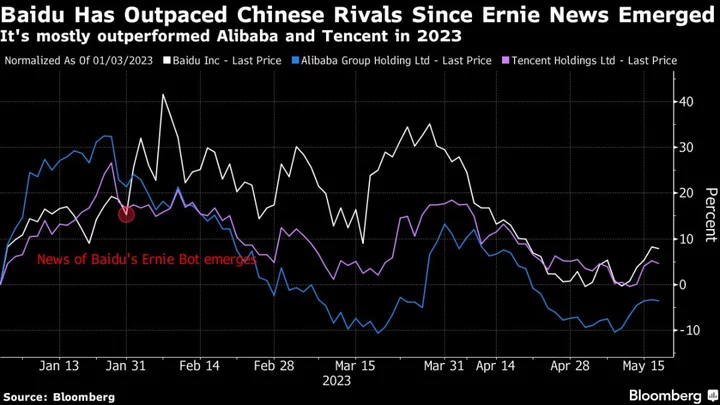As China pushes to challenge the US in outer space, President Xi Jinping is borrowing a page from the playbook NASA used for Elon Musk’s SpaceX by directly supporting local startups looking to take part.
The China Manned Space Agency, which on Tuesday returned three astronauts to Earth who had been working since May on the Tiangong space station, wants to pay private-sector companies for future missions.
The CMSA has received proposals to use privately developed rockets for cargo transport trips to the Chinese space station, deputy director Lin Xiqiang said at a press briefing on Oct. 25, a day before the launch of Shenzhou 17, which sent a new three-astronaut team to Tiangong.
“Through the open bidding, we are pleased to see that China’s private commercial space companies are developing rapidly and growing rapidly, and their enthusiasm to participate in manned space missions is also high,” he said.
The CMSA hasn’t yet disclosed the size or value of contracts it could award to private-sector firms.
By offering the chance to win missions from the space agency, China is pursuing a strategy used by NASA with Musk’s Space Exploration Technologies Corp.
SpaceX was one of two companies to win a combined $3.6 billion cargo-flight contract in 2008, just two years after launching its first rocket. Since then, it’s successfully bid for other NASA projects, including a $2.9 billion contract in 2021 to land astronauts on the moon.
In the decade since China opened the space industry to private investment, the sector has notched some major successes. Beijing Interstellar Glory Space Technology, a startup known as i-Space, sent the country’s first privately developed rocket into orbit in 2019, and several other companies followed its success.
But the industry is at a crossroads, with the pace of fundraising slowing. Startups, which raised an average of $1.2 billion a year between 2019 and 2022, are on track to generate about half that amount this year, according to China Space Monitor.
“China has had an effort for several years now to try and bolster its own commercial space sector, because I think they see the benefits the US has gotten and are trying to emulate it,” said Brian Weeden, Washington-based director of program planning at the Secure World Foundation, a space sustainability nonprofit.
“And while they have had some success, China’s commercial space sector is definitely not as big or as vibrant as that in the US,” he said.
Read More: Xi Charm Offensive Turns to Space as ‘Divine Craft’ Launches
Contracts from the space agency could support the Chinese industry in a way similar to the lift SpaceX received from NASA, said Lynette Tan, chief executive officer of Space Faculty Pte Ltd., a Singapore-based company that help clients train space-sector workforces.
“Engaging the private sector is definitely going to boost space development in China,” she said. “That means more people can come up with ideas and innovation. The same as in the US, which had the private-sector guy Musk changing the ecosystem.”
Some already receive some direct government support. Yizhuang, a sleepy district of low-slung industrial buildings in southeastern Beijing about 20 kilometers (12 miles) from Tiananmen Square, is the industry’s epicenter, with more than 40 rocket, satellite and services startups.
Companies in the district, home to the China Academy of Launch Vehicle Technology, a major source of talent for local firms, can qualify for government grants of much as 50 million yuan ($6.8 million), as well as rent subsidies.
Startups also have launched initiatives to raise their profile with the public.
LandSpace Technology operates a store on e-commerce site Taobao selling branded mugs and phone cases. Galactic Energy teamed with the company behind a popular type of rice noodles known as luosifen for a rocket launch in August, helping make Galactic Energy a trending topic on social media platform Weibo along with the hashtag “Luosifen is even popular in space”.
Yizhuang-based Orienspace, meanwhile, plans its first launch later this year with a rocket named after clothing company HLA Group Corp.
Businesses may also benefit from the higher profile of the space program with the general public. The China Space Foundation recently supported an exhibition at a gallery in a popular art district in northeastern Beijing, showcasing models of Chinese rockets and a lunar rover alongside simulations of landscapes on Mars and the moon.
In late September, a two-day music festival outside the capital organized with the support of the China National Space Agency attracted about 40,000 attendees watching performers on a rocket-shaped stage.
China’s private rocket industry still faces a major challenge achieving mass production, Kang Yonglai, founder of startup Tianbing Technology, also known as Space Pioneer, told the China Youth Daily in August.
“At present, the rocket industry’s annual production capacity is far from meeting the market’s current needs,” Kang said.









